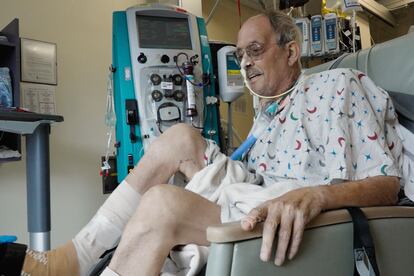Maryland man who received second pig heart transplant dies, hospital says
The heart transplanted to Lawrence Faucette, 58, had seemed healthy for the first month but began showing signs of rejection in recent days

The second person to receive a transplanted heart from a pig has died, nearly six weeks after the highly experimental surgery, his Maryland doctors announced Tuesday.
Lawrence Faucette, 58, was dying from heart failure and ineligible for a traditional heart transplant when he received the genetically modified pig heart on Sept. 20.
According to the University of Maryland School of Medicine, the heart had seemed healthy for the first month but began showing signs of rejection in recent days. Faucette died Monday.
In a statement released by the hospital, Faucette’s wife, Ann, said her husband “knew his time with us was short and this was his last chance to do for others. He never imagined he would survive as long as he did.”
The Maryland team last year performed the world’s first transplant of a heart from a genetically altered pig into another dying man. David Bennett survived two months before that heart failed, for reasons that aren’t completely clear although signs of a pig virus later were found inside the organ. Lessons from that first experiment led to changes, including better virus testing, before the second experiment.
“Mr. Faucette’s last wish was for us to make the most of what we have learned from our experience,” Dr. Bartley Griffith, the surgeon who led the transplant, said in a statement.
Attempts at animal-to-human organ transplants — called xenotransplants — have failed for decades, as people’s immune systems immediately destroyed the foreign tissue. Now scientists are trying again using pigs genetically modified to make their organs more humanlike.
Faucette, a Navy veteran and father of two from Frederick, Maryland, had been turned down for a traditional heart transplant because of other health problems when he came to the Maryland hospital, out of options and expressing a wish to spend a little more time with his family.
Many scientists hope xenotransplants one day could compensate for the huge shortage of human organ donations. More than 100,000 people are on the nation’s list for a transplant, most awaiting kidneys, and thousands will die waiting.
A handful of scientific teams have tested pig kidneys and hearts in monkeys and in donated human bodies, hoping to learn enough for the Food and Drug Administration to allow formal xenotransplant studies.
Sign up for our weekly newsletter to get more English-language news coverage from EL PAÍS USA Edition
Tu suscripción se está usando en otro dispositivo
¿Quieres añadir otro usuario a tu suscripción?
Si continúas leyendo en este dispositivo, no se podrá leer en el otro.
FlechaTu suscripción se está usando en otro dispositivo y solo puedes acceder a EL PAÍS desde un dispositivo a la vez.
Si quieres compartir tu cuenta, cambia tu suscripción a la modalidad Premium, así podrás añadir otro usuario. Cada uno accederá con su propia cuenta de email, lo que os permitirá personalizar vuestra experiencia en EL PAÍS.
¿Tienes una suscripción de empresa? Accede aquí para contratar más cuentas.
En el caso de no saber quién está usando tu cuenta, te recomendamos cambiar tu contraseña aquí.
Si decides continuar compartiendo tu cuenta, este mensaje se mostrará en tu dispositivo y en el de la otra persona que está usando tu cuenta de forma indefinida, afectando a tu experiencia de lectura. Puedes consultar aquí los términos y condiciones de la suscripción digital.








































